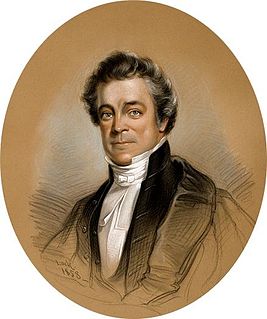Robert Nichol (ca 1780 – May 3, 1824) was a businessman, judge and political figure in Upper Canada.
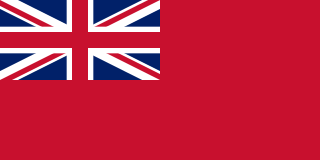
The Province of Upper Canada was a part of British Canada established in 1791 by the Kingdom of Great Britain, to govern the central third of the lands in British North America, formerly part of the Province of Quebec since 1763. Upper Canada included all of modern-day Southern Ontario and all those areas of Northern Ontario in the Pays d'en Haut which had formed part of New France, essentially the watersheds of the Ottawa River or Lakes Huron and Superior, excluding any lands within the watershed of Hudson Bay. The "upper" prefix in the name reflects its geographic position along the Great Lakes, mostly above the headwaters of the Saint Lawrence River, contrasted with Lower Canada to the northeast.
Born in Scotland around 1780, he arrived in Montreal in 1792 after becoming a seaman at an early age and headed west to the Niagara Peninsula. He found work on one of Robert Hamilton's ships, worked for several years as clerk for John Askin at Detroit and, in 1800, entered business transporting goods in partnership with Thomas Clark. In 1802, Clark returned to Scotland, leaving Nichol to run the business; this caused him financial hardship. In 1806, he was appointed justice of the peace in the Niagara District. In 1808, he took over the operation of several mills, a distillery and other businesses in Woodhouse Township; he also secured contracts supplying the British garrisons in the region. In 1811, he was accused by Joseph Willcocks in the Legislative Assembly of having mishandled public funds as a road commissioner; Isaac Brock, administrator of the province, felt that this accusation was retaliation for Nichol's actions in support of the administration. He was jailed but later released and filed suit for damages against the speaker of the house, Samuel Street.

Scotland is a country that is part of the United Kingdom. It covers the northern third of the island of Great Britain, with a border with England to the southeast, and is surrounded by the Atlantic Ocean to the north and west, the North Sea to the northeast, the Irish Sea to the south, and more than 790 islands, including the Northern Isles and the Hebrides.
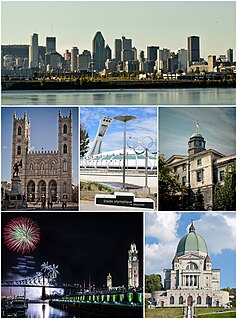
Montreal is the most populous municipality in the Canadian province of Quebec and the second-most populous municipality in Canada. Originally called Ville-Marie, or "City of Mary", it is named after Mount Royal, the triple-peaked hill in the heart of the city. The city is centred on the Island of Montreal, which took its name from the same source as the city, and a few much smaller peripheral islands, the largest of which is Île Bizard. It has a distinct four-season continental climate with warm to hot summers and cold, snowy winters.
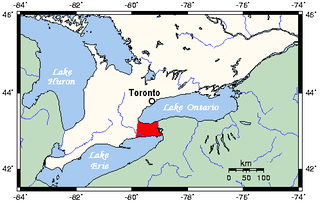
The Niagara Peninsula is the portion of Golden Horseshoe, Southern Ontario, Canada, lying between the southwestern shore of Lake Ontario and the northeastern shore of Lake Erie. Technically an isthmus rather than a peninsula, it stretches from the Niagara River in the east to Hamilton, Ontario, in the west. The population of the peninsula is roughly 1,000,000 people. The region directly across the Niagara River and Lake Erie in New York State is known as the Niagara Frontier. The broader Buffalo Niagara Region includes the Niagara Peninsula, the Niagara Frontier, and the city of Buffalo, New York.
In 1812, he became lieutenant-colonel in the Norfolk militia. In the same year, he was elected to the Legislative Assembly for Norfolk and he was appointed quartermaster general of militia. Besides transporting and supplying food and clothing to the troops, Nichol is also believed to have provided useful advice in coordinating troop movements during the War of 1812. His home and businesses suffered extensive damage during the war. Compensation for these losses was only approved after his death.

Norfolk County is a rural single-tier municipality on the north shore of Lake Erie in Southwestern Ontario, Canada with a 2016 population of 64,044. The largest community in Norfolk County is Simcoe, Ontario with a 2016 population of 13,922. The other population centres are Port Dover, Delhi, Waterford and Port Rowan, and there are many smaller communities. For several years in the late 20th century, the county was merged with Haldimand County but the merged entity was dissolved in 2000.

The War of 1812 was a conflict fought between the United States, the United Kingdom, and their respective allies from June 1812 to February 1815. Historians in Britain often see it as a minor theater of the Napoleonic Wars; in the United States and Canada, it is seen as a war in its own right.
During the later sessions of 6th Parliament of Upper Canada, Nichol acted as government house leader. He was re-elected in 1816; during the next parliament, he introduced a motion demanding increased power for the legislature and later introduced resolutions against the clergy reserves and restricting immigration from the United States, having shifted his position from government supporter to opposition. He also opposed the Sedition Act of 1804 that had been used to banish Robert Gourlay. He was re-elected in 1820; he helped establish a commission to improve transportation within the province and supported a proposal by Britain to united Upper and Lower Canada.
The 6th Parliament of Upper Canada was opened 27 July 1812. Elections in Upper Canada had been held in June 1812. All sessions were held at York, Upper Canada.

The United States of America (USA), commonly known as the United States or America, is a country composed of 50 states, a federal district, five major self-governing territories, and various possessions. At 3.8 million square miles, the United States is the world's third or fourth largest country by total area and is slightly smaller than the entire continent of Europe's 3.9 million square miles. With a population of over 327 million people, the U.S. is the third most populous country. The capital is Washington, D.C., and the largest city by population is New York City. Forty-eight states and the capital's federal district are contiguous in North America between Canada and Mexico. The State of Alaska is in the northwest corner of North America, bordered by Canada to the east and across the Bering Strait from Russia to the west. The State of Hawaii is an archipelago in the mid-Pacific Ocean. The U.S. territories are scattered about the Pacific Ocean and the Caribbean Sea, stretching across nine official time zones. The extremely diverse geography, climate, and wildlife of the United States make it one of the world's 17 megadiverse countries.
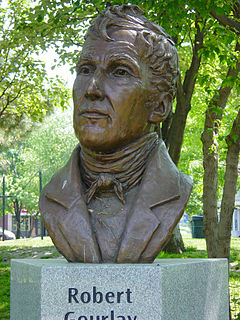
Robert Fleming Gourlay was a Scottish-Canadian writer, political reform activist, and agriculturalist.
In 1824, he was appointed surrogate judge for the Niagara District. Later that year, he died at Queenston Heights while on court business when his horse and carriage went over a cliff.

The Queenston Heights is a geographical feature of the Niagara Escarpment immediately above the village of Queenston, Ontario, Canada. Its geography is a promontory formed where the escarpment is divided by the Niagara River. The promontory forms a cliff face of approximately 100 m.

